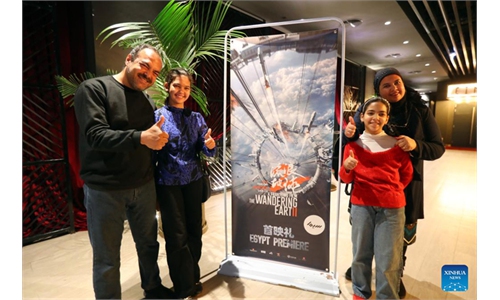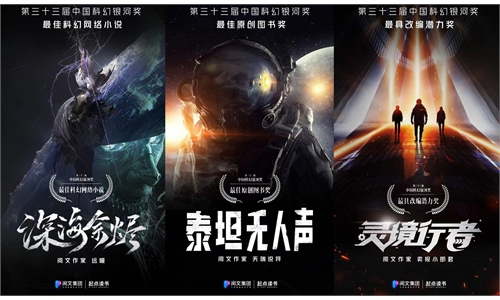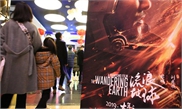ARTS / CULTURE & LEISURE
New sci-fi book depicts Chinese space station with broad imagination
Visiting the stars
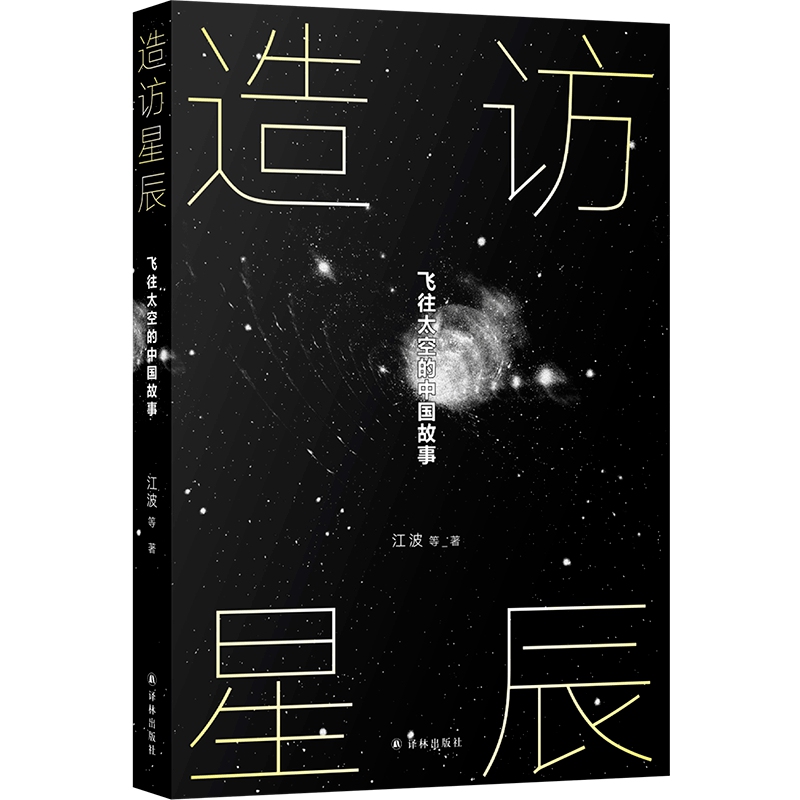
Title: Visiting the Stars
Authors: Jiang Bo, et al.
Publisher: Yilin Press
Year of publication: 2023
In the vast boundless universe, Chinese taikonauts in the Chinese space station used nanowires to save US astronauts who are trapped in a firing international station that was hit by a small celestial body. In the face of crisis, the Chinese and US space agencies put aside national politics, and cooperated to successfully weather the storm.
This thrilling space adventure comes from famed Chinese sci-fi writer Jiang Bo (pseudonym) whose short sci-fi novel Mingxuanyixian, or Fate Hangs on a Thread, is included in the newly published book Zaofangxingchen, or Visiting the Stars, the theme of which is the space station.
Previously, authored science fiction work did not have much understanding of the space station, with some high-profile works such as The Wandering Earth, Gravity and Salyut 7 mostly presenting disasters and adventures returning to Earth. But this book mainly depicts the universe to readers from the vantage point of the space station, the editor of the book told the Global Times, adding that Visiting the Stars might be translated into English and published overseas.
Profound inspiration
The book includes 11 different stories from 11 domestic science fiction writers who were inspired by a visit to a replica of the Chinese space station.
The visit left a deep impression on the writers including Jiang Bo who said he was very surprised and impressed when he saw the space station even as a facsimile.
"The model is built at an almost 1:1 ratio and the outlook is full of a sense of the future," he told the Global Times. He noted that the visit inspired him highly and it only took him two weeks to finish the short piece.
Similarly, the unforgettable visit was also a source of profound inspiration for Chinese sci-fi writer Bao Shu (pseudonym) whose work Our Martian tells the story of a parallel universe in which China's manned spaceflight was achieved 30 years ahead of schedule.
As a fan of Mars, Bao Shu told the Global Times that he wrote the story to pay tribute to the pioneers who dedicated themselves to China's aerospace industry in the 1950s.
During the writing and creative process, Bao Shu said he referred to a lot of available resources on Mars and referenced the history of the Chinese space industry.
The two writers said the Chinese readers' vision has been broadened and their tastes are evolving, which creates a higher demand for sci-fi works. Though everyone that has some basic writing skill can be a sci-fi writer, a high-quality sci-fi work requires the writers to master solid knowledge in physics, aerospace technology as well as social anthropology, a rich imagination, strong logic, and most importantly, cognition and the ability to foreshadow related cutting-edge technologies.
The two sci-fi writers pointed out that an excellent sci-fi work usually have a successful world value, which The Three-Body Problem and The Wondering Earth have set good examples, and this requires a writer to possess a strong logical reasoning ability. Otherwise, the work of literature may have a poor sense of substitution, and potholes in situating the story.
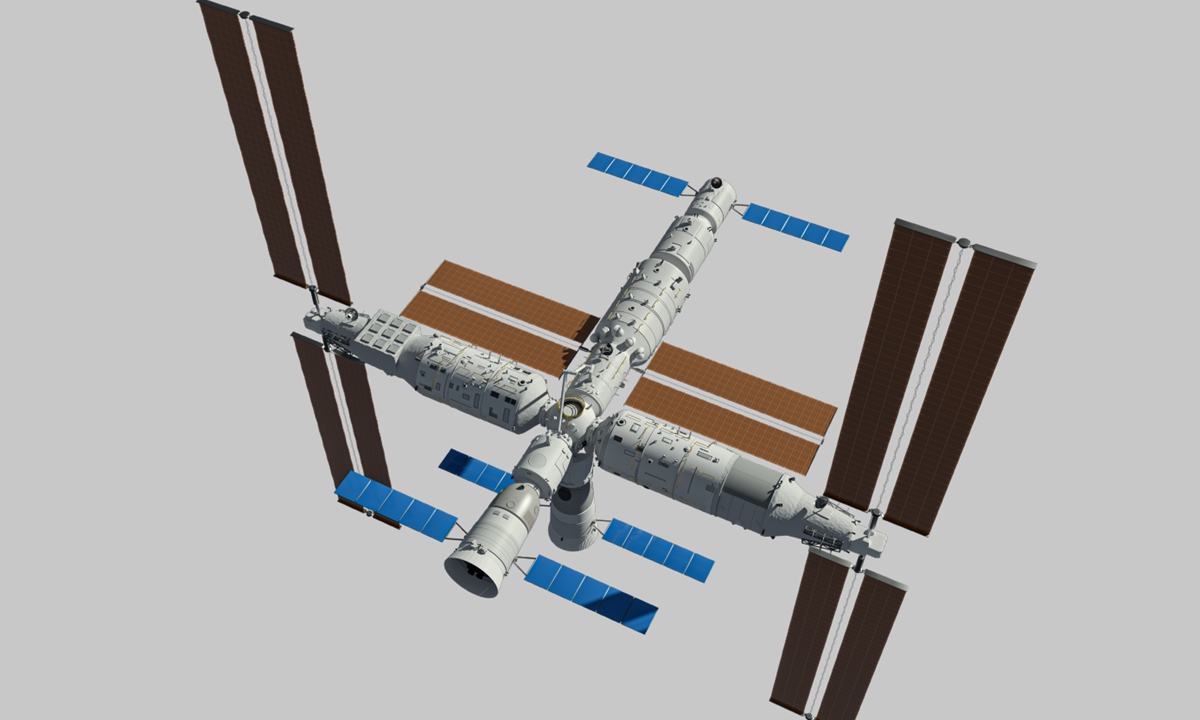
Tiangong, China's space station Photo: VCG
A huge potentialWith the huge success of The Three-Body Problem and The Wondering Earth, more Chinese writers have participated in the creation of sci-fi literature, leading to a sci-fi literature craze and "fever."
The two writers noted that Chinese sci-fi literature is seeing a more prosperous creation in genres. Additionally, in hard sci-fi literature works, more elements including traditional Chinese culture, suspense and romance have been incorporated into the creation. However, China still lacks influential works compared with the major sci-fi powers in the West, they contended.
The "golden age" of US sci-fi literature has passed, and surprisingly, many outstanding US sci-fi works have not won awards like the Hugo Award - an annual literary award for the best science fiction or fantasy works and achievements - that they deserve due to "political correctness," according to the two writers.
The new age of Chinese sci-fi literature is yet to come, and Chinese sci-fi literature still has a large potential, especially works with distinctly Chinese characteristics, they said. Though US sci-fi literature has matured with thousands of works put out each year, Chinese writers are capable of writing some unique works that reflect the rapid development of China, they told the Global Times.
"The sci-fi literature works that reflect the changes in China and convey the value of a global community of shared future would further enrich sci-fi literature in the world, and might be a mainstream trend in China soon," Jiang Bo said, adding that his Mingxuanyixian can be one such example.
"Regardless of the US government's attitude toward China, US astronauts are with us in the universe and they are the out-standing representatives of humanity. Even if there is only a glimmer of hope, we must work hard to rescue them," a Chinese taikonaut in the story thought.
According to Jiang Bo, in the face of crises, humanity is one family. The story conveys the value of "a global community of shared future," which is quite meaningful amid current tense China-US relations.
Literature is a mirror of reality. The creation of sci-fi literature is highly tied to the country's development of the space industry. With the booming development of Chinese cutting-edge scientific and technological achievements, Chinese writers need to consider how to integrate these achievements with sci-fi and turn them into interesting stories to help them influence more people, he said.

